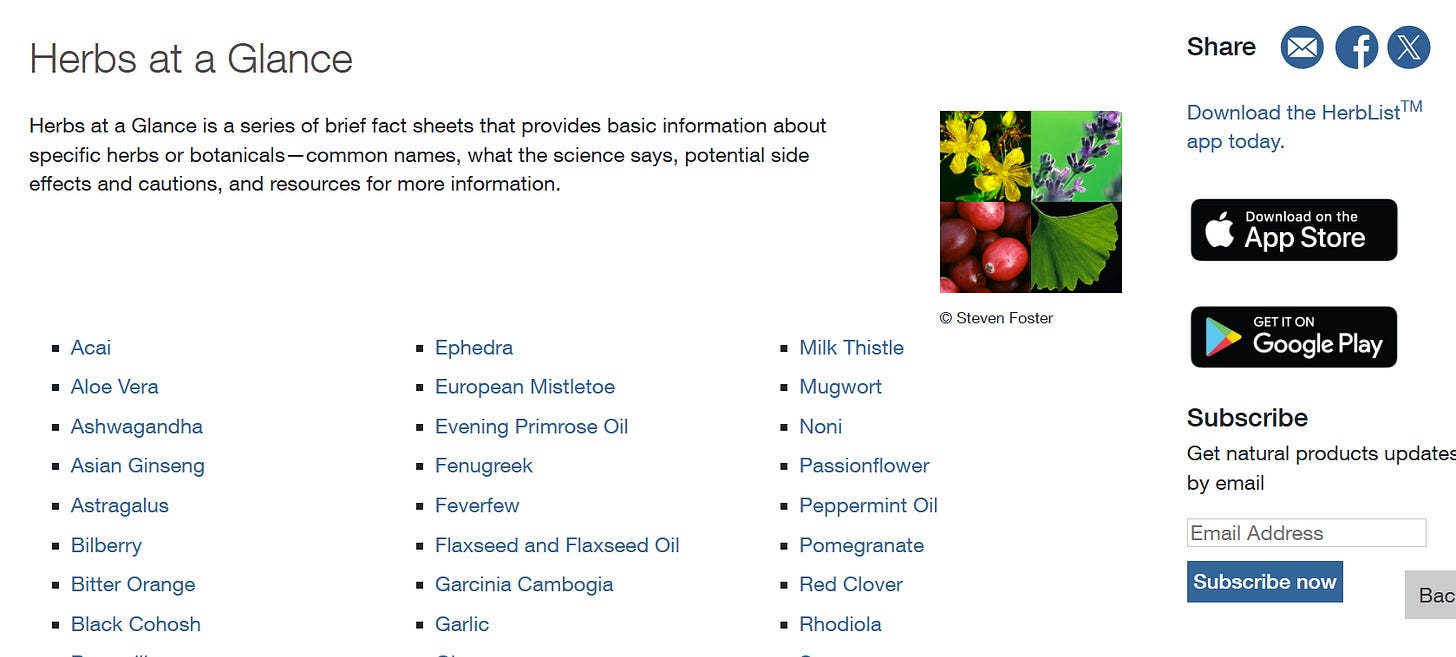Resource Roundup: Herbs at a Glance
Reliable information on herbal remedies can be hard to find, but one NIH institute helps fill that gap. Unfortunately, it’s now slated for elimination in the new federal budget proposal.
In 2023, annual sales of herbal dietary supplements reached an astounding $12.5 billion USD. Nearly one in three Americans use these supplements daily, yet accurate information on their ingredients remains difficult to find. Misinformation on video and social media platforms continues to hinder public understanding of the safe and effective use of herbs.
The National Center for Complementary and Integrative Health (NCCIH) has been a critical player in filling this void. This National Institute of Health (NIH) institute funds research and provides information on natural products (e.g., medicinal herbs and their chemical constituents), chronic pain, and complementary modalities for whole person health (e.g., yoga, acupuncture, etc.).
Unfortunately, NCCIH is on the chopping block of the newly proposed Fiscal Year 2026 Discretionary Budget Request from the Executive Office of the President—see page 14:
The Budget also eliminates funding for the National Institute on Minority and Health Disparities (-$534 million), which is replete with DEI expenditures, the Fogarty International Center (-$95 million), the National Center for Complementary and Integrative Health (-$170 million), and the National Institute of Nursing Research (-$198 million).
The dust hasn’t settled. This is just one step in the budget process, and congressional action may bring many changes. But I’m extremely concerned. Eliminating this institute would come at the expense of the health of the tens of millions of Americans who rely on herbs as part of their daily healthcare routine.
Herbs at a Glance
One of the information services provided by NCCIH is Herbs at a Glance and their HerbList app, available for download on the App Store or Google Play.
Each plant included in this info site includes bullet point summaries of the current known science on each herb. For example, did you know that Ashwagandha “may be safe when taken in the short term (up to 3 months). There is not enough information to allow conclusions about its long-term safety to be reached,” or that it should be avoided during pregnancy and breastfeeding? Or how about “research shows that some ashwagandha preparations may be effective for insomnia and stress”?
Sites like this highlight the fact that NIH doesn’t just serve as a critical resource for advancing biomedical research and discovery of new medicines, but that it also serves a critical mission of providing accurate information to the public based on the current state of science and medicine.
The Takeaway
Herbal dietary supplements are part of the healthcare routines of roughly one-third of Americans. Yet despite more than $12 billion in annual out-of-pocket spending by consumers on these products, accurate information and research on their safety and efficacy remain scarce and in high demand.
The NIH’s National Center for Complementary and Integrative Health (NCCIH) plays a vital role in addressing this gap—but it is now at risk of being eliminated under the proposed federal budget. Over the years, NCCIH has supported rigorous studies on widely used herbs like echinacea, turmeric, and St. John’s wort, helping to clarify their benefits, risks, and interactions—research that typically falls outside the scope of pharmaceutical industry funding.
The bottom line: the public needs reliable research and accessible information to make informed health decisions. Now is the time to act. Contact your congressional representatives and urge them to preserve NCCIH and support continued investment in herbal medicine research.
Yours in health, Dr. Quave
Cassandra L. Quave, Ph.D. is a Guggenheim Fellow, CNN Champion for Change, Fellow of the National Academy of Inventors, recipient of The National Academies Award for Excellence in Science Communication, and award-winning author of The Plant Hunter. Her day job is as professor and herbarium director at Emory University School of Medicine, where she leads a group of research scientists studying medicinal plants to find new life-saving drugs from nature. She hosts the Foodie Pharmacology podcast and writes the Nature’s Pharmacy newsletter to share the science behind natural medicines. To support her effort, consider a paid or founding subscription to Nature’s Pharmacy or donation to her lab research.
The Plant Hunter is available in hardcover, paperback, audio, and e-book formats!








Thank you for this information
Dr. Quave!
Take care
Thank you for this post Dr Quave! Now I know why mainstream medical Drs are so clueless about herbs. I've been taking herbs for 15 years after being refused treatment for Lyme/Anaplasma by the VA. (I have mostly recovered only through herbs and supplements) I've never even heard of NCCIH and now I know why. I went there after reading your post and chose Milk Thistle. I was like, what? So went to turmeric which was slightly better but still basically useless. It was missing any reference to new research. Eg. cancer. What's really funny, or sad depending on your point of view is this article on another Gov website: https://pmc.ncbi.nlm.nih.gov/articles/PMC8990857/. A Comprehensive Review on the Therapeutic Potential of Curcuma longa Linn. in Relation to its Major Active Constituent Curcumin. I definitely will not be referring to this website (even if it's free) for anything and will continue to recommend other private websites to people looking for unbiased info.